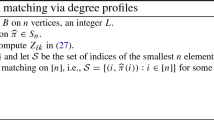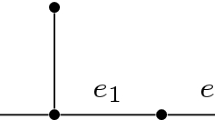Abstract
We present an improved average case analysis of the maximum cardinality matching problem. We show that in a bipartite or general random graph on n vertices, with high probability every non-maximum matching has an augmenting path of length O(log n). This implies that augmenting path algorithms like the Hopcroft-Karp algorithm for bipartite graphs and the Micali-Vazirani algorithm for general graphs, which have a worst case running time of O(m√n), run in time O(m log n) with high probability, where m is the number of edges in the graph. Motwani proved these results for random graphs when the average degree is at least ln (n) [Average Case Analysis of Algorithms for Matchings and Related Problems, Journal of the ACM, 41(6):1329-1356, 1994]. Our results hold if only the average degree is a large enough constant. At the same time we simplify the analysis of Motwani.
Similar content being viewed by others
Author information
Authors and Affiliations
Corresponding authors
Rights and permissions
About this article
Cite this article
Bast, H., Mehlhorn, K., Schafer, G. et al. Matching Algorithms Are Fast in Sparse Random Graphs. Theory Comput Syst 39, 3–14 (2006). https://doi.org/10.1007/s00224-005-1254-y
Received:
Published:
Issue Date:
DOI: https://doi.org/10.1007/s00224-005-1254-y




